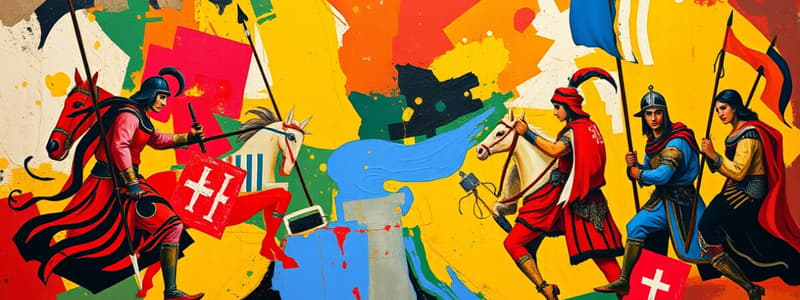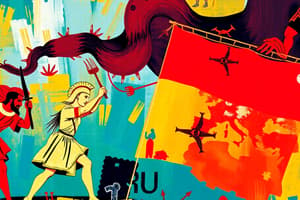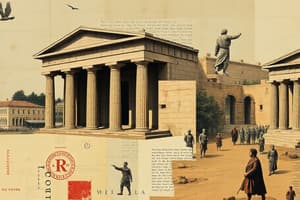Podcast
Questions and Answers
What was one of the strongest and largest empires at the time?
What was one of the strongest and largest empires at the time?
- Rome
- Greece
- Egypt
- Persia (correct)
Who were the leaders of Persia during the Persian Wars?
Who were the leaders of Persia during the Persian Wars?
Darius I and Xerxes
The Persian Wars took place from ______ to ______.
The Persian Wars took place from ______ to ______.
499 B.C. to 479 B.C.
The Battle of Marathon was a major defeat for Athens.
The Battle of Marathon was a major defeat for Athens.
What was significant about the Battle of Salamis?
What was significant about the Battle of Salamis?
Who was Themistocles?
Who was Themistocles?
What was the Golden Age of Greece?
What was the Golden Age of Greece?
Match the following historical figures with their contributions:
Match the following historical figures with their contributions:
The Delian League was an alliance between Athens and ______ city-states.
The Delian League was an alliance between Athens and ______ city-states.
The Peloponnesian War weakened Greece overall.
The Peloponnesian War weakened Greece overall.
Flashcards are hidden until you start studying
Study Notes
Persia
- One of the largest and most powerful empires during the 400s B.C.
- Central to Greek history, particularly in conflict against Athens and Sparta during the Persian Wars.
- Located in Asia, with the Persian people led by prominent figures like Darius I and Xerxes.
Persian Wars
- Spanning from 499 B.C. to 479 B.C., these wars were crucial for shaping Greek culture.
- Triggered by Persian expansionist ambitions and a misunderstanding of treaties by Athens.
- Notable battles occurred at Marathon, Thermopylae, and Salamis, pitting Greek city-states against the Persian Empire.
Darius I
- King of Persia responsible for initiating the Persian Wars, acting upon a misunderstood treaty.
- In 492 B.C., he sought revenge against Athens and those who aided the Ionians in revolt.
Battle of Marathon
- Occurred in the 490s B.C., 25 miles north of Athens.
- Darius I attempted to invade Athens but faced a surprising Athenian counter-attack, leading to significant Persian losses (6,400 men).
- Marked a pivotal victory for Athens in the Persian Wars.
Xerxes
- Son of Darius I, known for leading the Persian invasion of Greece in 480 B.C.
- Commanded forces during the crucial Battle of Salamis, which significantly impacted Greek history.
Battle of Salamis
- A naval confrontation between 480-479 B.C., occurring around the island of Salamis.
- Greek forces, led by Themistocles, utilized lighter ships to decisively defeat the larger Persian fleet, earning Athens acclaim and facilitating its Golden Age.
Themistocles
- Athenian general who orchestrated the Greek navy's strategy at Salamis.
- His tactics led to a major victory against the Persians, showcasing the effectiveness of the Greek naval forces.
Thermopylae
- A strategically significant mountain pass where the Greek army attempted to delay the Persian advance in 480-479 B.C.
- Symbolizes Greek resistance against overwhelming odds during the Persian invasion.
Leonidas
- King of Sparta known for his leadership during the Battle of Thermopylae.
- His decision to stay and fight with 300 Spartans reflects the valor and duty expected in Sparta, emphasizing the significance of resistance to Persian forces.
Golden Age
- Spanning from 461-429 B.C., a period marked by the peak of Greek cultural achievements.
- Predominantly occurred in Athens, post the Persian Wars, leading to the flourishing of arts and sciences.
- This era ultimately triggered the Peloponnesian War between Athens and Sparta.
Pericles
- Influential Athenian general during the Golden Age, known for rebuilding Athens after Persian destruction.
- His leadership characterized the height of Athenian democracy and cultural achievement in the 450s B.C.
Parthenon
- A symbol of Athenian glory, this temple dedicated to Athena was completed in 447 B.C.
- Features unique maiden sculptures replacing traditional columns, exemplifying classical Greek architecture.
Symposium
- A social institution in Athens where upper-class men engaged in discussions on literature and philosophy following banquets.
- Highlighted the cultural life of Athens and provided an exclusive social forum for discussions on public issues.
Aspasia
- A prominent metic woman in Athens known for her intelligence and eloquence.
- Influenced women's education and rights in the 400s B.C., providing guidance on domestic life.
Delian League
- An alliance formed between Athens and various city-states to protect against Persian aggression.
- Cleared the Aegean Sea of piracy and supported Ionia's liberation from Persian rule.
Peloponnesian War
- A civil conflict between Athens and Sparta from 431-404 B.C., deeply weakening Greek unity.
- Led to Spartan dominance and social chaos, ultimately diminishing faith in democratic governance across Greece.
Studying That Suits You
Use AI to generate personalized quizzes and flashcards to suit your learning preferences.




